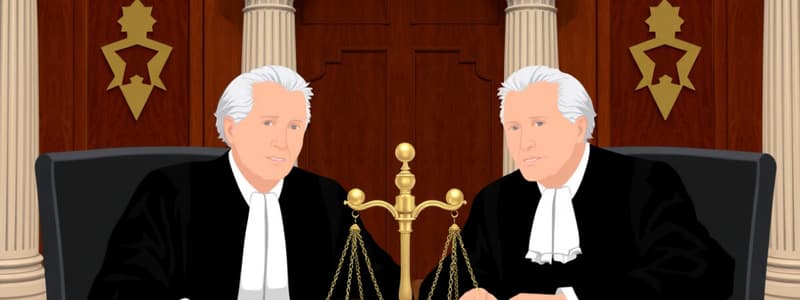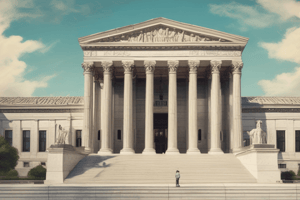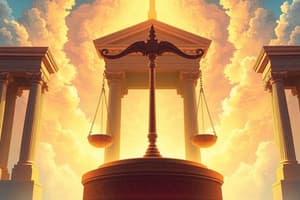Podcast
Questions and Answers
What is meant by the term dual court system?
What is meant by the term dual court system?
The dual court system means that there are two separate court systems in the United States. The national judiciary spans the country with its more than 120 courts. Each of the 50 States has its own system of courts, which primarily hear most cases in the United States.
What is taken into consideration when a federal judge is appointed by the president?
What is taken into consideration when a federal judge is appointed by the president?
The Constitution states that the President shall nominate judges with the Advice and Consent of the Senate. The President often considers political affiliations, selecting judges from leading attorneys, legal scholars, law school professors, and state court judges who share similar legal, political, and social views.
Describe the terms and pay of judges. Be specific.
Describe the terms and pay of judges. Be specific.
Judges of constitutional courts are appointed for life unless they resign, retire, or die in office. However, judges in special courts serve fixed terms, such as 15 years in certain courts and four years in the District of Columbia. Congress sets the salaries, and federal judges have a retirement arrangement providing full salary upon retirement after a certain age and years of service.
Describe the functions of the officers who perform the administrative operations of the federal courts.
Describe the functions of the officers who perform the administrative operations of the federal courts.
What are district courts?
What are district courts?
What is jurisdiction in relation to district courts?
What is jurisdiction in relation to district courts?
Flashcards are hidden until you start studying
Study Notes
Dual Court System
- The United States has a dual court system with two distinct court systems: federal and state.
- The national judiciary includes over 120 courts, while each of the 50 states maintains its own court system.
- State courts handle the majority of cases in the U.S.
Federal Judge Appointment
- The President nominates federal judges, requiring Senate approval ("Advice and Consent").
- Judicial selections consider political affiliations similar to other presidential appointments.
- Appointees often include top attorneys, legal scholars, and state judges.
- Presidents prefer nominees who align with their political and social views.
Terms and Pay of Judges
- Federal judges serve "during good Behavior," typically meaning lifetime appointments unless retired, resigned, or impeached.
- Special court judges serve fixed terms, such as 15 years for Courts of Federal Claims and others, and four years for D.C. Superior Court judges.
- Congress sets judges' salaries, which include substantial retirement benefits.
- Judges may retire with full salary after age 70 with at least 10 years served or at age 65 with 15 years of service.
Administrative Functions in Federal Courts
- United States magistrates, appointed by district court judges, manage various legal matters, including issuing arrest warrants and setting bail.
- Each federal district has at least one bankruptcy judge overseeing bankruptcy cases under the district court.
- United States attorneys, appointed by the President and Senate, prosecute federal crimes and represent the government in civil cases.
- U.S. marshals, also appointed by the President and Senate, execute arrest orders, secure jurors, and maintain order during federal proceedings.
District Courts
- The U.S. district courts serve as federal trial courts, totaling 94 across the country.
- Each state contains at least one federal judicial district; 89 districts correspond to the 50 states.
- Additional district courts exist for Washington D.C., Puerto Rico, Guam, and the Northern Mariana Islands, with at least two judges per district.
Jurisdiction
- District courts hold original jurisdiction over most federal cases, making them the principal trial courts in the U.S. federal court system.
Studying That Suits You
Use AI to generate personalized quizzes and flashcards to suit your learning preferences.




